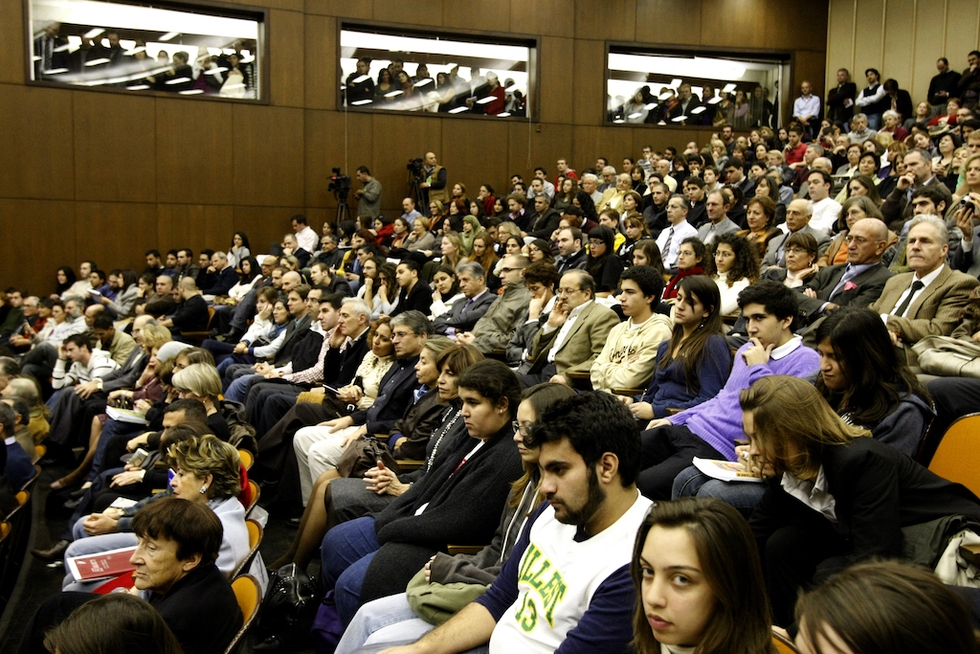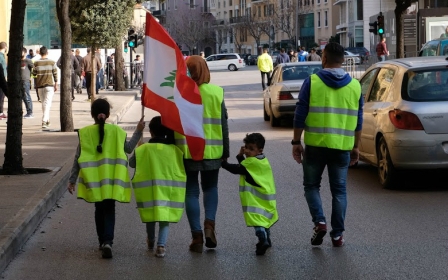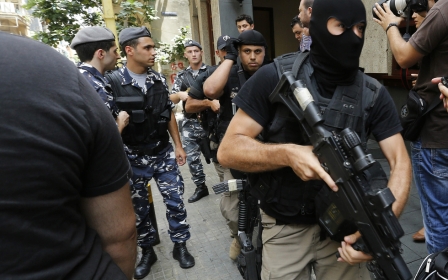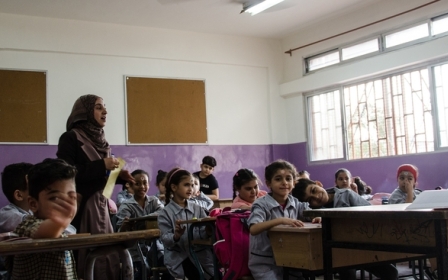US anti-terror law leaves Palestinian students facing uncertain future

GAZA CITY, Gaza - Daniela Massou, a 17-year old Palestinian from Bethlehem, is a student of physiology at the Lebanese American University (LAU) in Beirut.
Massou chose to study abroad to get away from the oppressive atmosphere of living in the West Bank, where Israel's occupation influenced every aspect of her life.
"I was not ready to cross checkpoints every morning to reach the university," she told Middle East Eye.
But on Wednesday 23 January, she and 12 other Palestinian students were called to a meeting with a representative from the US embassy, the vice president of LAU, the director of the US-Middle East Partner Initiative (MEPI) and the rest of the MEPI staff.
The students were informed that all American funding for Palestinians coming from the West Bank and Gaza had been cut, including MEPI's Tomorrow's Leaders programme, a scholarship serving Palestinian students studying at LAU.
In an email sent after the meeting, the faculty explained that with the US Congress's passing of the Anti-Terrorism Clarification Act of 2018 (ATCA), on 3 October, the US State Department was set "to cease funding to Palestinian students".
"Although the State Department's decision is effective immediately, LAU has committed to fully supporting the affected students in spring 2019," it read.
"While the university is exploring other sources of funding for the students affected to continue their studies, LAU is unable currently to make a firm commitment beyond that date."
Massou said the move came as shock.
"I felt like I lost everything," she said. "The first thought that popped into my head was literally: 'What am I without my education?' I felt hurt and empty.
"Then, 15 minutes later, all those emotions turned into anger and motivation to fight for my education and to get our story out there."
Terror lawsuits
ATCA allows American citizens to sue foreign entities that receive US assistance for past acts of alleged terrorism. As a result, receiving US aid of any kind could leave entities vulnerable to lawsuits from Americans allegedly harmed in attacks carried out by Palestinians.
Following the passing of the act, the Palestinian Authority (PA) recently announced it would refuse all US government aid as of 31 January.
In a copy of a 26 December letter that circulated in international media outlets earlier this week, PA Prime Minister Rami Hamdallah informed US Secretary of State Mike Pompeo of the decision, citing ATCA as the reason.
Tala Shurrab, a Palestinian from the Gaza Strip, graduated from the American International School in Gaza back in 2016.
I left Palestine for a good education, I am not going back without it
- Daniela Massou, student
Now studying at LAU, she said: "I still have no plans regarding the upcoming semesters. I have one year left in addition to this spring semester, I'm planting all my hope in LAU to grant me financial aid to finish my BA [Bachelor of Arts]."
Shurrab decided to study psychology to provide help for the victims of war and for young people in Gaza who are not privileged enough to pursue their education abroad. She believes she can go back to Gaza as a qualified psychologist to benefit her community.
She said that the Gaza Strip lacks adequate mental health centres and support.
Shurrab herself was diagnosed with complex post-traumatic stress syndrome (PTSD) after leaving the Gaza, and is aware of the number of psychological issues facing those in the besieged enclave - a factor that motivates her to finish her university studies.
'I still have hope'
On Thursday, the American University of Beirut (AUB), another prominent Lebanese university, announced that it would secure $1.2m in funds to ensure that Palestinian students affected by US scholarship cuts complete their courses up to graduation.
According to an AUB statement, US government representatives also informed the university earlier this month that students from the occupied West Bank and Gaza Strip would no longer be eligible for comprehensive scholarships under MEPI's Tomorrow's Leaders programme.
The funding will cease as of 31 January.
The ramifications of the ATCA legislation come on top of US President Donald Trump's decision to cut almost all humanitarian aid to the PA, with those projects set to be phased out gradually.
In 2018, UNRWA, the UN agency for Palestinian refugees, struggled to overcome a crippling funding crisis caused by the US cancelling its entire aid contribution.
The organisation, which had counted on a $1.2bn annual budget, was left with a $446m gap when the Trump administration announced that the United States - until then UNRWA's biggest state donor - would no longer fund the agency.
UNRWA has managed to overcome the cuts after Gulf countries, including the United Arab Emirates, Saudi Arabia, Kuwait and Qatar each donated about $50m each. The EU also increased its donations to the organisation.
Massou said that despite the difficulties, she would not be letting the funding cuts get in the way of her graduating.
"I still have hope, I didn’t give up yet," she said. "I left Palestine for a good education, I am not going back without it."
Stay informed with MEE's newsletters
Sign up to get the latest alerts, insights and analysis, starting with Turkey Unpacked
Middle East Eye delivers independent and unrivalled coverage and analysis of the Middle East, North Africa and beyond. To learn more about republishing this content and the associated fees, please fill out this form. More about MEE can be found here.




